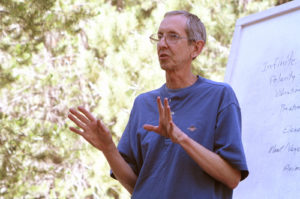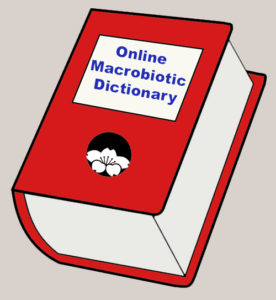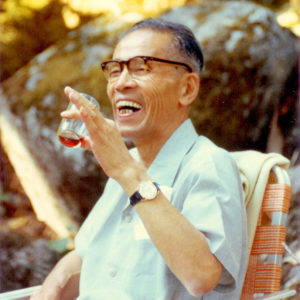
Completed Entries
Juice from chopped and ground leeks used as a drink for poisonous bites or food poisoning.
See Cautionary note.
The power of adaptation to the environment through internal changes. “Life is a passage by which living beings are liberated from the finite world to enter into the First World (the Infinite, God) beginning at the human level, ascending through the animal and vegetal worlds, then on through the worlds of elements, pre-atomic particles, vibration or energy, the two poles of yin and yang, returning finally to the infinite world.” Order of the Universe, 69.
The foundation of Western scientific thinking “…based on the law of identity (A is A), the law of contradiction (A is not non-A), and the law of the excluded middle (X cannot be A and non-A at the same time)….This logic is negated by the Order of the Universe….Without deep thinking, the statement ‘A is A’ is valid. But from the careful observation of the world and our experiences, it is obvious that there is no A in existence identical to another A. In other words, ‘A is A’ is imaginary thinking, not realistic, because A is always changing. A is no more A at the next second. Such thinking is paradoxical thinking well expressed by the teachings of Lao Tsu, Buddha, and other Oriental wise men. George Ohsawa called this paradoxical thinking ‘supreme judgment.’ In his seven stages of judgment, it can be seen as the last, or the first.” Kaleidoscope, 206.
See Instinct-Intuition.
A concept presented by Herman Aihara: “Macrobiotics amounts to finding the limitations and trying to live within them. And when we are living within our physical limitations, then our spirituality is free. Macrobiotics seeks freedom in spirit. For that we have to first understand the physical limitations. If we act in an unlimited way physically, then our spirituality is limited.” Kaleidoscope, 306.
Liquids: Determining the right quantity and type of liquids to drink is very important for a successful macrobiotic practice. The basic recommendation is to drink according to one’s condition and need—enough but not too much, with thirst as a guide. Factors leading to more liquids being needed include eating large amounts of fatty foods and animal proteins, living in a hotter and/or drier climate, and being physically active. Factors leading to less liquids being needed include eating primarily whole grains and fresh vegetables, living in a colder and/or wetter climate, and being physically inactive. Most all liquids are yin and thus someone who is strongly attracted to excess liquids implies he or she has become too yang; for example, by eating too much yang food like salt or using too many yang food preparations.
In macrobiotic thinking, drinking too much makes the blood thinner and diluted, meaning more blood must be circulated to deliver enough nutrients to the cells and thus more work for the heart and kidneys. In this case, drinking less means the kidneys function better and there is less stress on the heart. Drinking too little can result in dehydration and a whole host of problems. Ohsawa taught people to use the amount of urination per day as a guide: females 2-3 times, males 3-4 times, and more often for older people.
Macrobiotic advice is to drink after (or between) meals rather than during them. Kukicha (twig tea); spring, well, or filtered water; and teas made from roasted whole grains such as barley or brown rice are the main liquids consumed in macrobiotic practice although other teas and drinks are consumed on special occasions.
The first principle of macrobiotic food selection is that the best fresh foods for an individual are those that grow in one’s local environment and that are in season.
A long or great duration of individual life and used in the subtitle of Zen Macrobiotics: The Art of Longevity and Rejuvenation. In macrobiotic thinking, the quality of one’s life is emphasized over life extension.
The root of the lotus plant—a plant with edible blossoms, leaves, roots, and seeds that grows in tropical paddies. The roots grow under the pressure of muddy water and are a good-quality starch. May be purchased fresh or dried.
Juice from grated lotus root used as a drink for asthma attacks, uterine bleeding, or coughing up blood.
See Cautionary note.
Grated lotus root used to help clear nasal passages.
See Cautionary note.
Grated lotus root, ginger, and white flour made into a paste-like consistency and used to dissolve mucus from the chest, throat, or sinuses.
See Cautionary note.
Warm water, lotus root juice, ginger juice, and salt used as a gargle for hoarseness or loss of voice.
See Cautionary note.
Ohsawa wrote about seven types of love similar to the seven stages or aspects of judgment. He presented these kinds of love to distinguish “lower” types from universal, unconditional love, to which he encouraged people to aspire.
- Physical love is instinctive and characterized by appetite, hunger, or animalistic behavior. Ohsawa encouraged people to enjoy this kind of love, but also to develop the other kinds as well.
- Sensorial love is erotic, seeking physical comfort and sensual pleasure—what one finds agreeable or disagreeable.
- Sentimental love is emotional and based on what one likes and dislikes—what one finds desirable or undesirable.
- Intellectual love is characterized by love of science based on calculation, understanding, and systematic thinking—what one finds useful or useless.
- Social love is love based on the desire for companionship and approval from others and can be seen in love of country by the actions of reformers.
- Ideological love is the love of ideas and can be viewed in the works of philosophers and other original thinkers.
- Universal love is unconditional love that embraces all things without question or distinction, distributing eternal joy of life to all.
Projected Entries
Language
Lao Tsu (Tzu)
Law of God
Leprosy
Leucine
Leukemia
Leukoderma
Leukorrhea
Liberty
Liquids
Lima Company (Gevaert)
Linoleic acid
Linolenic acid
Lipases
Lipoprotein lipase
Liquids
Liver
Logarithmic spiral
Logic
Lotus root
Low blood pressure
Lying
Lysine
Questions or Comments?




